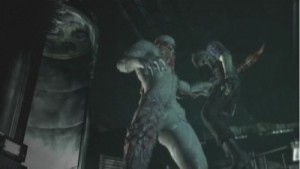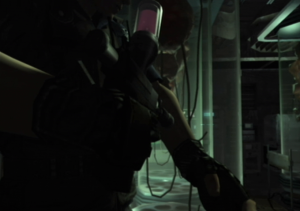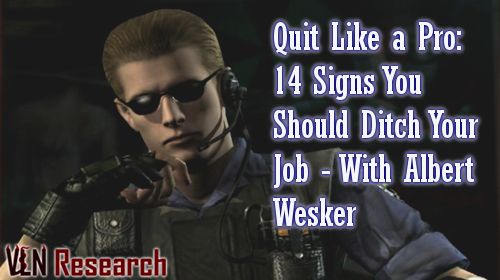
Welcome to the 5th Tuesday of the month! That means it Bonus Blog time! Today I’m covering of my favorite topics: quitting jobs. While the last day at a job is the best day ever, you have to know when that day should come. How many times a day do you use profanity, either in your head or aloud, regarding your job? How many times do you threaten to quit per day? Guess what, you should use more criteria than those to decide when to abandon ship.
Today Albert Wesker, the most successful villain from Resident Evil*, is going to help us know if and when to quit. He’s an expert at checking out just before the self destruct sequence initiates.
Let’s go!
1. Your job doesn’t align with your long-range life goals:
What’s your goal? Yes, paying your bills and keeping a roof over your head are goals, but is that your purpose in life? If you’re unsure, take quality time to discover your purpose and your interests. When you know them, you can break them into smaller goals. If you’re just living day to day, paycheck to paycheck, you might as well stay at your job. It’s making money, right? You’ve got food to shove in your pie hole and shelter to keep the mosquitoes out, right? If you don’t have any aspirations, you’ve pretty much made it in life at this point. Remember, if you have food for a few days, a few sets of clothes, a vehicle, and a room to live in with electricity and water, you’re better off than almost 99% of the rest of the world.
Wesker knew his goal: Create his own Umbrella Corp, design a super virus, dominate all competition. Wesker worked not only as a researcher for a pharmaceutical company, but also as an elite SWAT team officer. The pharm company is a no brainer, but what about the PD? Given the opponents he’d have to face to further his ends, the skills he learned for STARS would serve him well.
2. You’ve advanced as far as you can toward your goal in this job:
 The job started out as a challenge that pushed you farther toward achieving your goal. You climbed the ladder, learned skills, made connections, maybe even had some good times. But now the joy is gone. Work feels as stagnant as a ghetto kiddie pool. The scum of boredom clings to the walls. The leeches of drudgery latch on the second you walk through the door. Feeling restless? Start looking for the next stepping stone – just make sure it’s not an alligator.
The job started out as a challenge that pushed you farther toward achieving your goal. You climbed the ladder, learned skills, made connections, maybe even had some good times. But now the joy is gone. Work feels as stagnant as a ghetto kiddie pool. The scum of boredom clings to the walls. The leeches of drudgery latch on the second you walk through the door. Feeling restless? Start looking for the next stepping stone – just make sure it’s not an alligator.
Wesker maxed out his science skills in the research department. Then things came to a head after he and Birkin assassinated their mentor, Marcus. The research, Spencer’s odd orders (kill your superior), and the general air of mystery in Umbrella Corp led Wesker to seek more information. He joined the intelligence department of UC and became a STARS team captain. I’m not sure how long he planned to be there, but likely not long. When the Arklay Mountain murders occurred and the Umbrella Training Facility’s outbreak spiraled out of control, Wesker moved ahead with his plan to leave.
Eventually Umbrella Corp outlived its usefulness to Wesker entirely.
3. You’re sick of gatekeepers blocking your progress:
There’s chance for advancement and it can further your aims. Everything’s going smoothly – until you hit the drawbridge. The keepers of the gates aren’t about to let you advance. Maybe you don’t fit their standards even though you work smart and hard. Or maybe they just think you suck because you don’t like jelly donuts. Same result: you aren’t going anywhere. Why are you letting them assign your worth? Get out and make your own way.
Wesker felt trapped at his current level. He had bigger dreams: starting his own Umbrella Corp. By rights he should have been a much more higher-ranking officer in UC. Spencer kept Wesker leashed, or so Spencer thought. Once Wesker abandoned Umbrella with the data, his career took off.
4. Your boss is more concerned about his or her work than you:
 The whole point of a boss is to lead a team, not try to advance him or herself. Many a department and company has crumbled because managers who should’ve kept their eyes on the squad goal decided to stare off into left field at their own glory. These people forget that they rise and fall by the successes and failures of their team.
The whole point of a boss is to lead a team, not try to advance him or herself. Many a department and company has crumbled because managers who should’ve kept their eyes on the squad goal decided to stare off into left field at their own glory. These people forget that they rise and fall by the successes and failures of their team.

In Umbrella Corp, most of the managers were intent on furthering their own futures first. Wesker and Birkin were actually good managers: they worked hard to achieve the team’s mission.
In contrast, Police Chief Irons at the Raccoon City PD, an Umbrella Corporation pawn, was only interested in his own fortunes. Wesker took advantage of this to a certain extent to manipulate the STARS teams’ deployment. But Wesker knew this wasn’t a long-term job. It was only a step toward his goal.
Marcus, the leech researcher and mentor to Wesker and Birkin, cared more about his private research than the interests of the company or about keeping tabs on his proteges. Upper Management didn’t appreciate this.
5. Your ideas are disregarded or ignored:
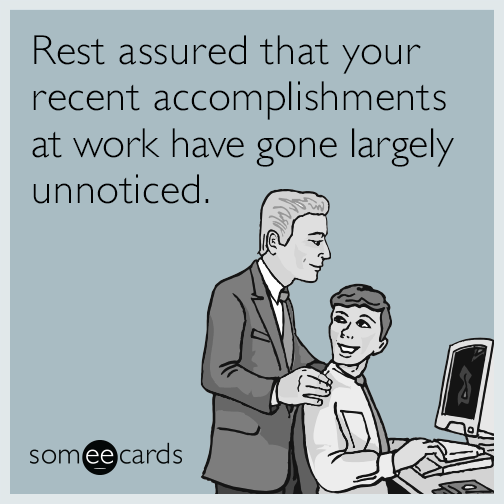 Ideas are the lifeblood of any institution. Without innovation, the place will crumble or be overrun by the competition. Your ideas are valuable. You care about your work environment and know how it could improve. A good employer and manager will listen to your ideas and implement them if they seem logical. The feeling you get from this is incredibly fulfilling. You feel like you’re part of the team and making a positive impact.
Ideas are the lifeblood of any institution. Without innovation, the place will crumble or be overrun by the competition. Your ideas are valuable. You care about your work environment and know how it could improve. A good employer and manager will listen to your ideas and implement them if they seem logical. The feeling you get from this is incredibly fulfilling. You feel like you’re part of the team and making a positive impact.
Does your workplace encourage ideas? Or does your boss ignore you? Worse, do they seem to support you, even encourage you to do most of the work toward executing your idea, but then turn around and shut you down when the time to actually put your ideas into practice comes? You don’t need that.
Wesker and Birkin had fairly free rein in their studies, but what they worked toward was Spencer’s decision. At the end of the day, UC swooped in to steal not only Marcus’s leech work, but also Birkin’s G Virus. Not cool, especially when the Boss Man wants to kill you on top of it.
6. You get criticized in public or are made to feel inferior:
Compliment in public, criticize constructively in private. That’s been standard management doctrine for years. Problem is, a lot of “managers” don’t follow it. There’s are few things worse than being torn into by your boss in front of your colleagues.
On a lower but still infuriating level, the slow burn level, is being made to feel like a nobody. Example: After you’ve worked tirelessly for ages for the company, they bring in a new person and suddenly he or she is a golden child. They receive resources, opportunities, and slack you never dreamed of. The best part? They aren’t even as qualified as you. Heck, they might even now be your supervisor!
We don’t know that Wesker or Birkin were ever called out in public. I doubt it, as they seemed to get along with Marcus. But when Alexia Ashford came on the scene, it felt like a slap in the face to Birkin. She was practically a child genius. She made advances where he hit brick walls. Wesker didn’t take it personally, but I think her presence did have an effect on him, as he admired her abilities.
7. You feel like just a number with no recognition or purpose:
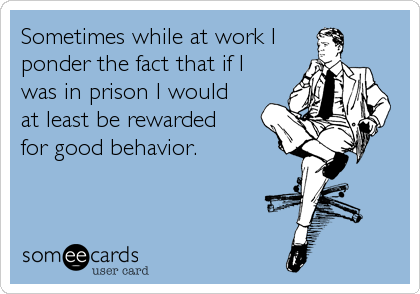 It’s not that we want to be constantly patted on the back for every little thing we do at work. We don’t. Congratulating me on stapling papers would just be patronizing. But we do like to feel like we play an important part in the team. We like to be acknowledged for our hard work and especially our exceptional work. It’s also nice to be recognized by your name and reputation, not just your job title.
It’s not that we want to be constantly patted on the back for every little thing we do at work. We don’t. Congratulating me on stapling papers would just be patronizing. But we do like to feel like we play an important part in the team. We like to be acknowledged for our hard work and especially our exceptional work. It’s also nice to be recognized by your name and reputation, not just your job title.
After Wesker and Birkin disposed of Marcus, Wesker started wondering about UC. While he and Birkin were still appreciated by Spencer, what guarantee did they have that they’d stay in his good graces? Spencer was eccentric on the best days. On the worst days, he ordered his employees to assassinate his other employees.
8. No one shares your mindset:
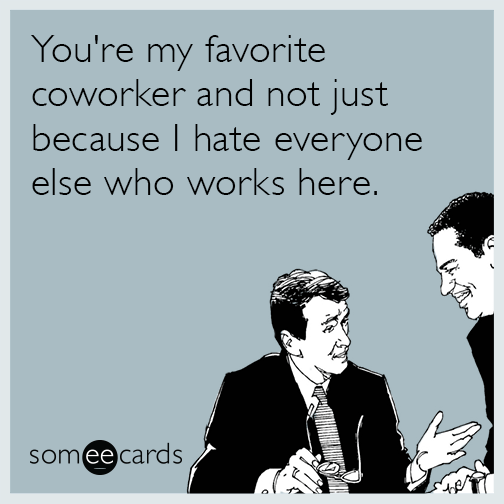 Great minds think alike, as the saying goes. But without anyone who shares your goals or at least your mindset, you become an outcast. Even if you’re not shunned, you don’t feel camaraderie, and you especially don’t receive any intellectual stimulation. Good ideas can become great ones when you bounce them off coworkers who share your interests. Many times, friendships that start in workplaces over ideas become start-up companies of their own. You need to have people around who are on your wavelength.
Great minds think alike, as the saying goes. But without anyone who shares your goals or at least your mindset, you become an outcast. Even if you’re not shunned, you don’t feel camaraderie, and you especially don’t receive any intellectual stimulation. Good ideas can become great ones when you bounce them off coworkers who share your interests. Many times, friendships that start in workplaces over ideas become start-up companies of their own. You need to have people around who are on your wavelength.
Wesker started working with Birkin at age 17. Birkin was 15. They shared work ethic, ideas on research (read: willingness to do just about anything to further the research), and hunger for advancement. The only thing Birkin wasn’t so keen on was leaving Umbrella Corp with Wesker. Too bad for Birkin. Before they parted for good, though, Birkin gave his research partner the Prototype virus that would bless Wesker beyond his wildest dreams.

12. You have a plan and a brain:
 Don’t ditch that job just because you had a bad few weeks. Think rationally. I’m serious. If there really is no good solution to your problems with the job, you still need to wait a second. What’s your game plan
Don’t ditch that job just because you had a bad few weeks. Think rationally. I’m serious. If there really is no good solution to your problems with the job, you still need to wait a second. What’s your game plan* after you leave? Sure, that first day off is amazing, but how are you going to pay your bills? Risks are fine, but even skydivers have a parachute. Don’t leap before you know your landing.
Wesker knew his plan. He knew what data he wanted and how to use it. He’d probably planned it for some time, considering how detailed it was. Yes, he seized the chance that presented itself, namely the outbreak in Raccoon City, but he did that so well because it matched his game plan, which matched his goal.
14. You’re just done:
People say you’ve got a good job. You don’t necessarily hate it. You might even enjoy some aspects of the work. But you’re restless and have no interest in continuing employment there. Sometimes it’s the little things that pile up that drive you off. Sometimes it’s a shift in coworkers or work policy. Whatever the reason, you know bigger and better opportunities await elsewhere.
In theory, Wesker could have continued working for Umbrella Corp. Even after failing to secure the Training Facility and the Express, he could have returned to Spencer. It was time to continue the plan he’d been working toward. Thus we’ve come full circle to knowing your goal.
Still not sure? Take the test to see if you should quit.
♦ Sources:
10 Reasons to Quit Your Job Already
16 signs it’s time to quit your job
11 Signs You Definitely Should Quit Your Job Soon
11 Signs That You Should Leave Your Job
SomeECards – Workplace
10 Reasons You Should Never Get a Job – submitted by Twisted Jenius
♦ Further reading:
Understanding Albert Wesker: How he can help us succeed in life – (Part 1)
Understanding Albert Wesker: How he can help us succeed in life – (Part 2)
Villainous opportunism: How to take advantage of every opportunity, Albert Wesker-style
Agree? Disagree? Let us know in the comments. Perform your own villain assessments with the Villain Matrix. Use the Villain Matrix spreadsheet that comes free when you join the Research Team, where you’ll also get our newsletter with its exclusive updates and content.
(*Affiliate link, meaning you get a movie/DVD/book/game/whatever, I get a few pennies, and everybody’s happy!)

